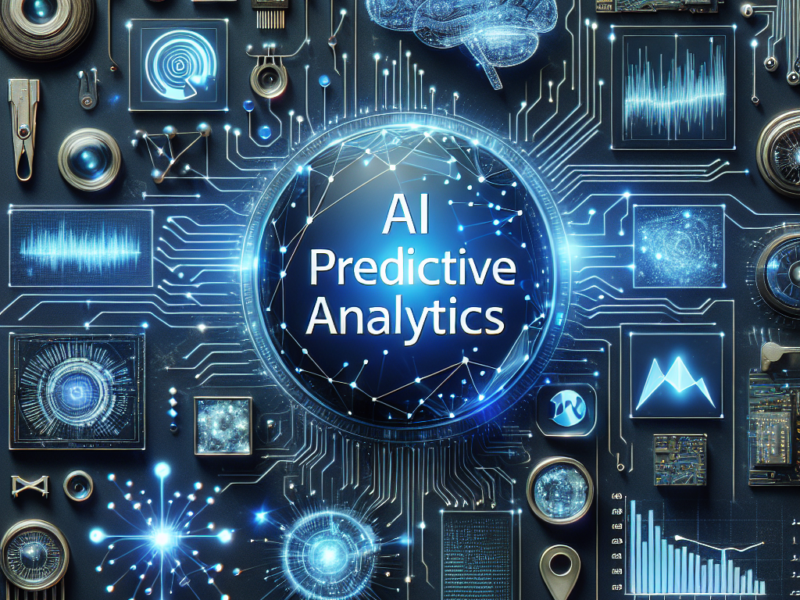In today’s fast-paced and data-driven world, industries are increasingly adopting advanced technologies to gain insights, streamline operations, and drive innovation. Among these technologies, Artificial Intelligence (AI) and predictive analytics stand out as game-changers, enabling businesses to anticipate future trends and make informed decisions. By harnessing the power of AI-powered predictive analytics, organizations across various sectors are transforming their operations, enhancing customer experiences, and achieving sustainable growth.
Understanding Predictive Analytics and Its Importance
Predictive analytics refers to the use of statistical algorithms and machine learning techniques to analyze historical data and forecast future outcomes. By identifying patterns and correlations within vast datasets, predictive analytics allows businesses to make predictions about customer behavior, market trends, operational efficiencies, and other critical factors.
The importance of predictive analytics in modern business cannot be overstated. It empowers organizations to:
- Anticipate Customer Needs: By analyzing customer behaviors and preferences, businesses can tailor their offerings, improving engagement and satisfaction.
- Optimize Resource Allocation: Predictive models can identify trends in resource usage, allowing for more efficient distribution of resources and reducing waste.
- Minimize Risks: Organizations can identify potential risks and mitigations by forecasting future events and trends.
- Enhance Decision-Making: Data-driven insights facilitate more informed and effective decision-making processes.
Transformative Impacts Across Industries
- Healthcare
In the healthcare sector, AI-powered predictive analytics is revolutionizing patient care and operational efficiency. By analyzing patient data, including medical histories, lab results, and demographics, healthcare providers can predict future ailments and recommend personalized treatment plans. Furthermore, predictive models assist hospitals in optimizing staff allocation, predicting patient admissions, and managing supply chain logistics effectively. This not only improves patient outcomes but also reduces costs.
- Finance
The financial industry leverages predictive analytics to enhance risk management, fraud detection, and customer service. Banks and financial institutions use advanced algorithms to analyze transaction patterns, spotting anomalies that may indicate fraudulent activities. Predictive analytics also aids in credit scoring, allowing lenders to assess the likelihood of loan defaults based on historical data, thus managing risk more effectively.
- Retail
In the retail space, predictive analytics transforms how businesses understand consumer behavior. By analyzing purchase history, social media interactions, and market trends, retailers can forecast demand for products, optimize inventory levels, and personalize marketing strategies. This not only increases sales but also reduces markdowns on unsold inventory, thereby improving profitability.
- Manufacturing
Manufacturers are using AI-powered predictive analytics for predictive maintenance, leading to reduced downtime and lowered operational costs. By analyzing machinery performance data, companies can forecast potential equipment failures before they occur, allowing for timely maintenance. Additionally, these analytics help optimize supply chains and improve production efficiency by predicting demand fluctuations.
- Transportation and Logistics
Predictive analytics plays a crucial role in enhancing the efficiency of transportation and logistics. Companies use data to forecast shipping demands, optimize delivery routes, and manage fleet maintenance. By analyzing weather conditions, traffic patterns, and historical shipping data, logistics providers can streamline operations and ensure timely deliveries, ultimately enhancing customer satisfaction.
Challenges and Ethical Considerations
While the benefits of AI-powered predictive analytics are significant, several challenges must be addressed to fully realize its potential. Data privacy and security are paramount concerns, particularly in sensitive industries like healthcare and finance. Organizations must navigate regulatory frameworks and ensure that consumer data is handled responsibly.
Moreover, biases in data and algorithms can lead to flawed predictions and unintended consequences. A commitment to ethical AI practices, diversity in data representation, and continuous monitoring of algorithm performance are critical to mitigating these risks.
The Future of Predictive Analytics
As technology continues to evolve, the future of AI-powered predictive analytics looks promising. Advances in machine learning, natural language processing, and big data analytics are set to further enhance predictive capabilities. Businesses that embrace these advancements will be better positioned to navigate an increasingly complex and competitive landscape.
In conclusion, AI-powered predictive analytics is revolutionizing industries by empowering organizations to make data-driven decisions that enhance efficiency, reduce costs, and improve customer satisfaction. As we move forward, harnessing the power of predictive analytics will not only facilitate organizational success but also drive innovation and transformation across sectors, shaping a future that is smarter, more efficient, and more responsive to the needs of consumers. The future is here, and it’s data-driven.











